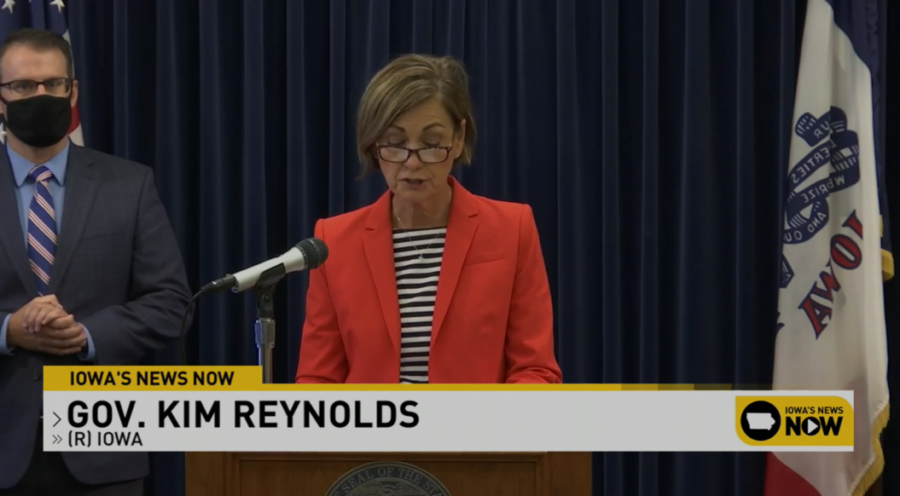State Reps: $21 million in CARES Act funds should have been used to help Iowans
Kim Reynolds continued to encourage social distancing for bars and restaurants in Sept. 1’s proclamation.
October 22, 2020
Gov. Kim Reynolds has improperly spent more than $21 million in federal coronavirus relief funds. She must correct the misallocation before the end of the year or face having to repay the money, according to a letter sent to the governor’s office by state auditor Rob Sand.
The money, which is from the Coronavirus Relief Fund provided by the Coronavirus Aid, Relief and Economic Security Act, or CARES Act, was used to pay for a new human resources and accounting system from Workday, a software vendor, as well as to pay portions of the salaries of the governor’s staff.
CARES Act funds are only authorized to be used for costs incurred due to the COVID-19 public health emergency that was not previously accounted for in the state’s budget and which were incurred between March and December of 2020.
The use of the funds to pay for staff salaries first came to light in a September blog post published by Bleeding Heartland. In the post, blogger Laura Belin pointed to documents obtained from the Iowa Department of Management, which she said showed the staffers paid with CARES Act funds did not meet the criteria for their salaries to be covered by those funds.
In the letter, Sand called for the governor’s office to provide detailed records showing the funds spent on salaries were, in fact, for work performed directly in response to the pandemic. The letter stated that “an inadequate…or indirect focus [on the pandemic], and/or inadequate record-keeping effort” could result in the funds having to be repaid.
According to the letter from Sand, Reynolds previously defended the use of funds for the Workday system as an effort to allow the state to better and more quickly respond to employee needs during the pandemic. Sand rejected these arguments, saying the contract for the Workday system was entered into in 2019, well before the pandemic began, and was not scheduled for implementation until 2021.
The new Workday system has previously garnered controversy, both for its use of CARES Act funds and for the way in which the contract was selected. As early as August, news outlets were reporting Democratic state legislators questioning the use of relief funds as well as Sand’s intention to investigate the matter.
In a press conference Wednesday, Reynolds said her office would be sending a letter to the auditor’s office defending the reasons for using pandemic relief funds and explaining why it is an appropriate expense.
“Hopefully, we’ll get the answer we think we should get,” Reynolds said. “And if not, we’ll readjust and do what we need to do. We’re not going to spend dollars in a manner that is not appropriate.”
The governor’s office has not responded to additional requests for comment.
Many Democratic lawmakers question why CARES Act funds were used for costs that were already in the budget.
“The $21 million for Workday was something that they had planned pre-CARES Act and pre-coronavirus,” said Ross Wilburn, a Democrat representing Iowa House District 46, which includes areas on the north side of Ames. “Did she not budget enough money for purchasing and implementing that system, and have they been doing adequate tracking for employees who have been dedicated toward relief efforts?”
Lawmakers have also said the funds should have been spent on costs directly related to pandemic response and relief.
“There are other areas where that funding could have gone,” Wilburn said. “For example, funding PPE [personal protective equipment] for a lot of the workers that are out there.”
Wilburn also called for more of the money to be put toward small business relief programs.
Beth Wessel-Kroeschell, a Democrat representing Iowa House District 45, which includes Iowa State’s campus, agrees the funds would have been better spent combating the pandemic.
“If we were testing more people, contact tracing…and isolating positive tests, we could get a handle on this pandemic and get this economy going the way it should be going,” Wessel-Kroeschell said. “Instead, we’re sitting out here in the red zone [for coronavirus cases.]”
Wessel-Kroeschell also said the state is doing nothing to make sure Iowa’s vulnerable populations are protected.
On Wednesday, the state reported 31 new COVID-19 deaths and 1,276 new confirmed cases, as well as 534 people hospitalized, a new daily record high.
“A lot of students are very frustrated that they’re not able to be in class…and having those great opportunities,” Wessel-Kroeschell said. “And that’s because we haven’t done what we should do.”
A representative from Iowa State University declined to be interviewed regarding the use or potential uses of funds but provided a statement regarding the CARES Act.
“Iowa State is appreciative of the CARES funding it received from the U.S. Department of Education,” Bonnie Whalen, associate vice president for institutional financial strategy, said in the statement. “Since there are different parameters and stipulations attached to the various types of CARES funding, we can only say that the federal CARES funds we’ve received are being allocated in ways that have supported our students and helped us maintain operations during a very difficult time.”
Wilburn also called for the House and Senate appropriations and oversight committees to review the use of the funds if the governor does not correct the situation.
In a statement released Monday, Claire Celsi, a West Des Moines Democrat and the ranking member of the House Appropriations subcommittee responsible for the governor’s office, accused Reynolds of using pandemic relief funds for political gain.
“Governor Reynolds is using the CARES Act money as a means to fund pet projects and make Iowa’s budget appear flush with excess funds,” Celsi’s statement said.
Republican legislators on the House and Senate appropriations and oversight committees did not respond to requests for comment.

















